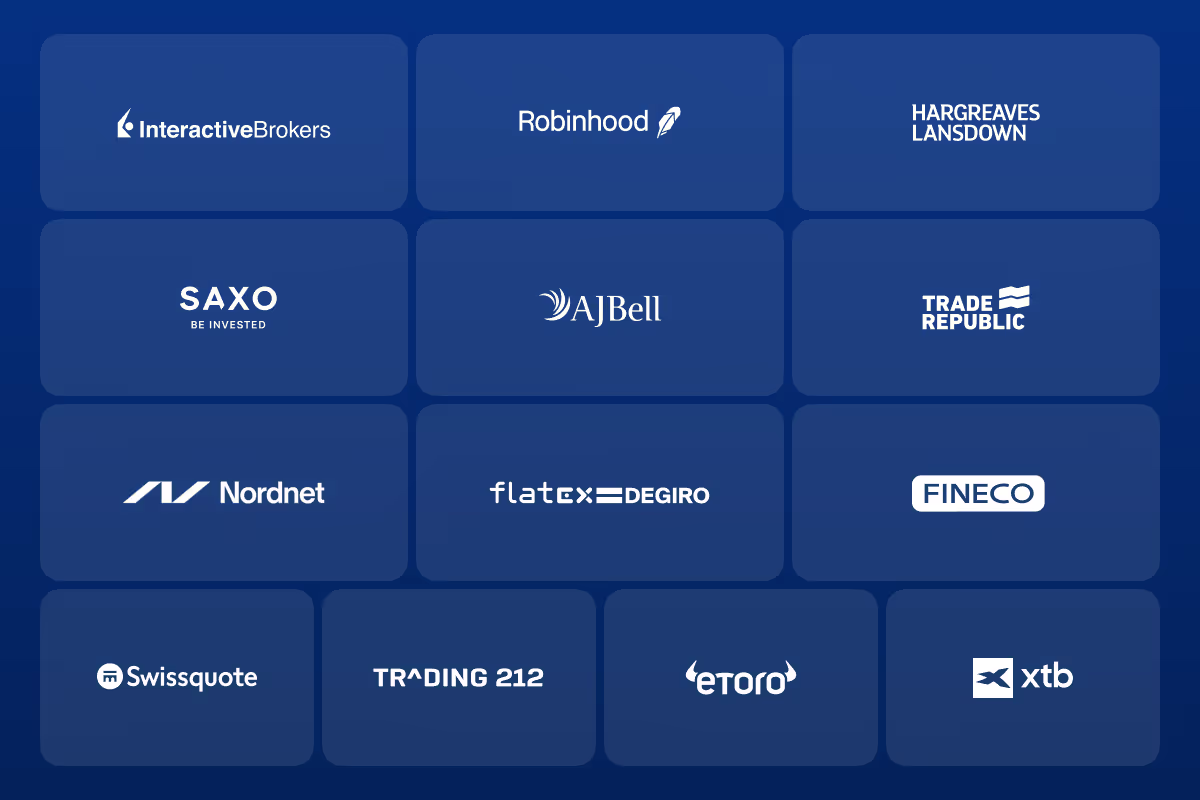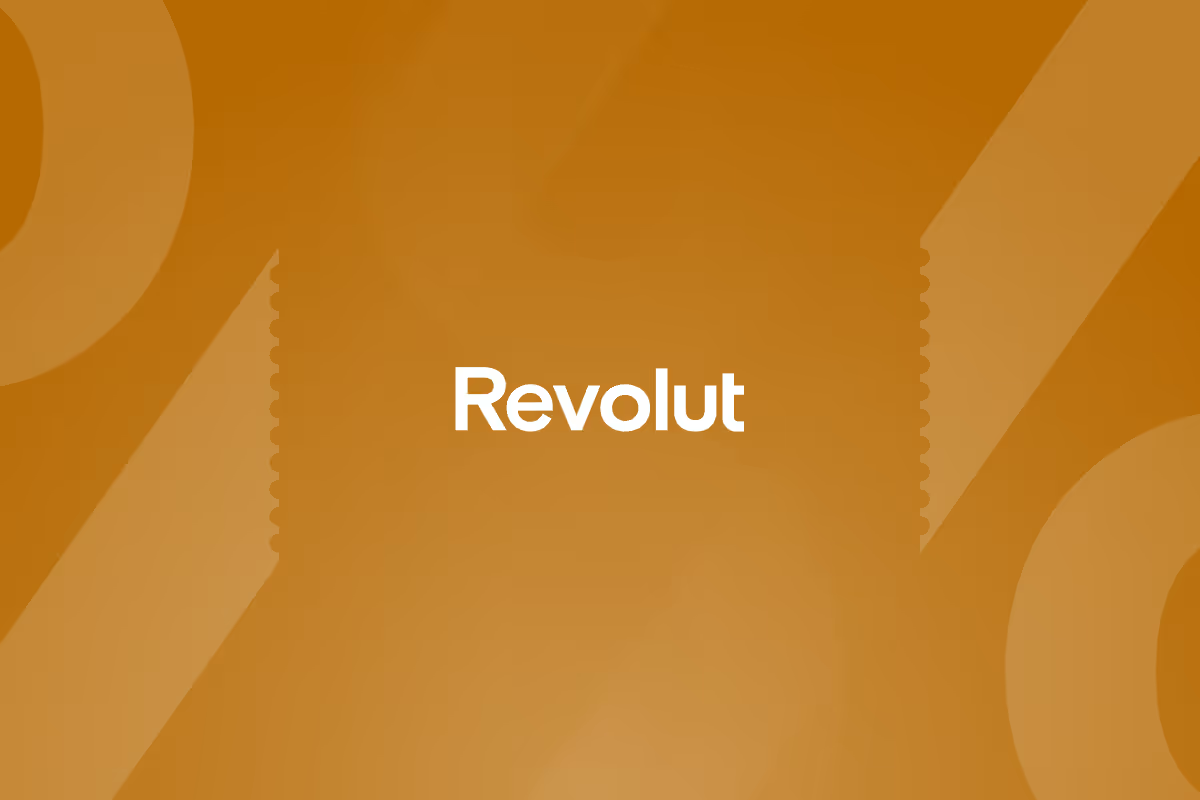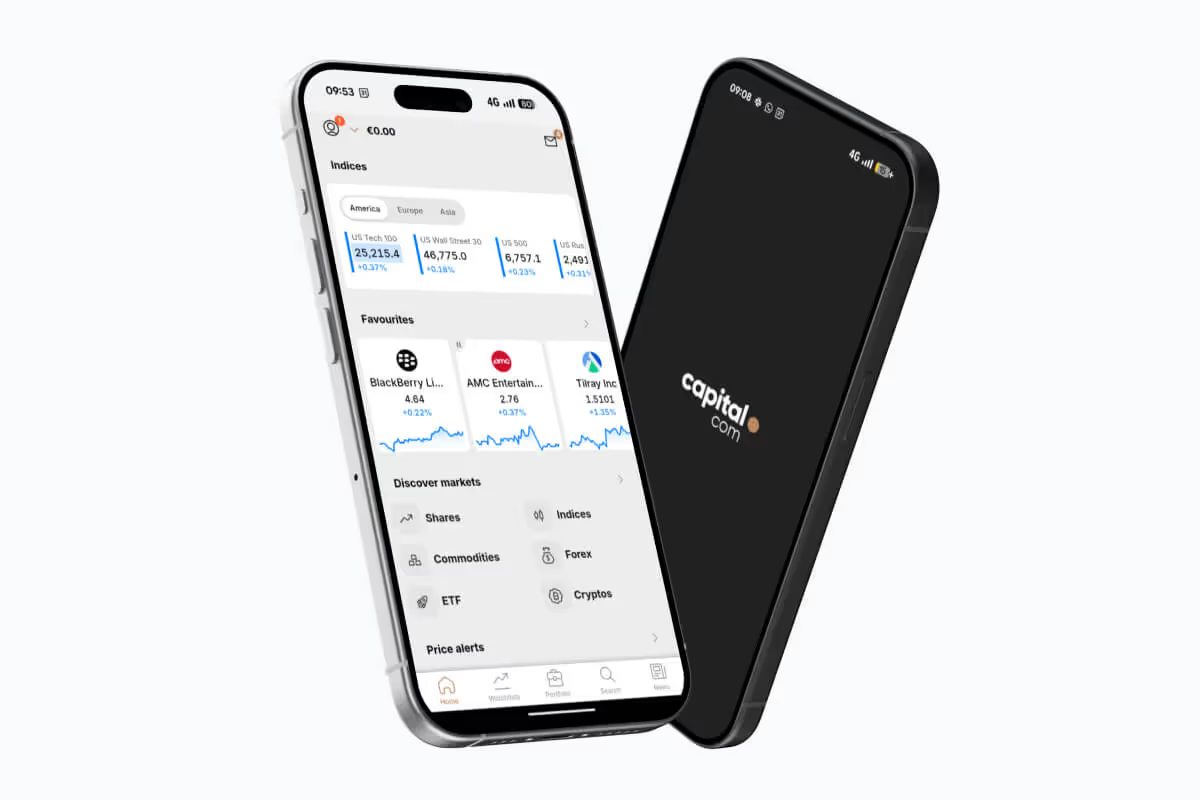Biggest Online Brokers in Europe (ranked by AUM in 2026)



In the evolving world of personal finance, knowing where and how your money is managed is just as important as investing itself.
One key metric that helps identify the top players in the industry is Assets under Management (AUM), a reflection of the total client assets overseen by a financial institution.
This metric not only indicates a broker’s scale but also speaks about the trust it has from individual and institutional investors.
This article explores the largest brokers operating in Europe by AUM (or the equivalent metric).
Whether you're selecting a broker for your next investment or simply curious about the financial players shaping the European market, this guide offers valuable insight.
Firstly, what is Assets under Management?
Assets under Management (AUM) are the total value of assets that clients have entrusted to a broker or asset manager.
As the name suggests, they aren’t the assets of the broker, but rather the assets they can manage. A higher AUM often indicates greater trust and financial strength, but it is not the only indicator.
Please note that Assets under Administration (AUA) is the more correct term when speaking about brokers. This is the total client assets the broker safeguards without making discretionary investment decisions.
True Assets under Management (AUM), by contrast, refer to funds that an investment manager actively allocates and manages under a fiduciary mandate. For the sake of simplicity, this article uses the more familiar label “AUM” as a shortcut for total client assets on the platform.
Brokers vs. Asset Managers - What is the difference?
Before diving into the list, it's important to understand the distinction between brokers and asset managers, as they serve different roles in the financial ecosystem.
- Brokers are platforms or firms that allow you to buy and sell investments like stocks, ETFs, bonds, and other securities. They provide the tools, market access, and execution services needed to invest, whether you're managing your portfolio or using professional advice. Think of brokers as the "market access points" for investors.
- Asset managers, on the other hand, are companies that create and manage investment products (like mutual funds or pension funds). They make decisions about how money is allocated within those funds, based on investment strategies. While you might invest in a fund from an asset manager, you’ll likely do so through a broker.
For this article, the focus is exclusively on brokers, even if some also offer their own funds or portfolio management services. For example, Amundi, with over €2.25 trillion in assets under management (AUM), is Europe's largest asset manager; however, it is not included here because it doesn't act as a broker for retail investors.
Similarly, we exclude Vanguard UK and Fidelity International’s retail platform from the main ranking because their core business is Asset Management and not brokerage.
Why does this matter? For retail investors and personal finance enthusiasts, a broker’s client asset size and client count can signal its market position, stability, and popularity. Again, a useful indicator of financial strength.
Top Brokers in Europe by AUM
Note: All currency conversions were calculated using the last day of May from European Central Bank reference rates, normally accepted as the mid-market exchange rates for EUR conversions. Values were rounded to the closest unit of billion for simplicity purposes. Freedom24 and IG Group were not considered in the analysis for not disclosing the amount of the client’s equity.
1. Interactive Brokers AUM: $628.2 billion (€554 billion)
Interactive Brokers (IBKR) is a US-based, low-cost brokerage firm that has experienced intense growth, both in the U.S. and globally. In terms of the number of clients, the broker reached 3.79 million client accounts worldwide.
As of May 2025, Interactive Brokers reported $628.2 billion in ending client equity, essentially the total value of customer holdings on the platform. That’s about €553 billion when converted. This figure marks a 29% year-over-year increase, again demonstrating IBKR’s rapid growth. Their platforms are not only used by individuals, such as you and me, but also by institutions, advisors, and other professionals.
2. Robinhood AUM: $255 billion (€225 billion)
Robinhood has become especially popular among Millennials due to its commission-free model. It is very popular in the U.S. as the number of costumers suggest. In Mainland Europe, it currently only supports cryptocurrency trading, as covered in this article, and doesn't offer access to stocks or ETFs, unlike in the U.S.. However, in the UK, Robinhood has launched a full brokerage app, giving users access to a wide range of investments.
As of May 2025, Robinhood held roughly $255 billion in customer assets (about €225 billion) and served 25.8 million funded customer accounts, up nearly two million year-on-year.
3. Hargreaves Lansdown AUM: £155.3 billion (€185 billion)
Hargreaves Lansdown (HL) is the UK’s largest direct-to-consumer investment platform, mainly known for its ISAs, pensions, and fund investing. By the end of 2024, it managed £155.3 billion in Assets under Administration (about €186 billion) and served over 1.9 million clients. HL is well-suited for long-term savers and those looking for a broad fund selection and reliable service.
4. Saxo Bank AUM: DKK 853 billion (€114 billion)
Saxo Bank is a Danish investment bank and multi-asset broker founded in 1992, and has pioneered online trading for retail investors with proprietary trading platforms.
Saxo Bank serves both retail investors and other banks that white-label its tech. It finished 2024 with DKK 853 billion in client assets (about € 114 billion) and almost 1.3 million accounts, an all-time high. Mainly present in Europe (UK, Switzerland, the Netherlands, etc.) and Asia (Singapore, Hong Kong, Australia, etc.).
5. AJ Bell AUM: £90.4 billion (€108 billion)
AJ Bell is one of the UK’s leading investment platforms and stockbroker services. Based in Manchester, AJ Bell offers a range of products, including the Youinvest platform for retail investors and an Investcentre for financial advisors. It provides ISAs, SIPPs (pensions), general trading accounts, and even its own low-cost funds and ready-made portfolios.
AJ Bell has built a reputation for low fees and a user-friendly platform, making it a favorite among cost-conscious UK investors. As of March 2025, AJ Bell’s platform assets under administration reached a record £90.4 billion, about €107.2 billion in euros, and almost 600k clients.
6. Trade Republic AUM: €100 billion
This German phone-first fintech broker’s pitch is simple: €1 commission on stock deals, and interest passed straight from the ECB rate through clients’ cash accounts. Besides being a broker, it is regulated as a German bank and offers the German deposit guarantee scheme.
They have a big penetration among the young generation and just announced a milestone of over 8 million customers (doubled from last year), managing €100 billion in assets on the platform.
7. Nordnet AUM: SEK 1,032 billion (€95 billion)
Nordnet is a leading online broker and digital bank in the Nordic region, offering a platform for stock trading, funds, pensions, and savings across Sweden, Norway, Denmark, and Finland. They have been pioneers in low-cost investing in Scandinavia.
As of May 2025, Nordnet’s customers held SEK 1,032 billion in savings capital on the platform. That translates to roughly €95 billion in assets under custody. Nordnet’s also reached 2.2 million customer accounts.
8. flatexDEGIRO AUM: €76.5 billion
flatexDEGIRO is a pan-European online brokerage that resulted from the 2020 merger of Germany’s flatex AG and the Netherlands’ DEGIRO. This combination created one of Europe’s largest and fastest-growing brokers, offering low-cost trading fees across 15 European countries. As of May 2025, they serve about 3.24 million Europeans, with Assets under Custody of about €76.5 billion.
What sets flatexDEGIRO apart is its hybrid structure: it runs as a bank licensed in Germany (flatex), and also as DEGIRO’s giant online brokerage infrastructure. DEGIRO aims to democratize investing in Europe by making brokerage access affordable, safe, and digital-first.
9. Fineco Bank AUM: €66.3 billion
Fineco Bank is an Italian bank that was originally part of UniCredit, and now has evolved into one of Europe’s most efficient digital banks. It offers everything from current accounts to stock trading and portfolio management, all on a single integrated platform.
By year-end 2024, it crossed €66.3 billion in Managed Assets, while its customer base reached over 1.7 million. Fineco’s growth is powered by a hybrid model: a zero-fee current account to attract deposits, an in-house fund supply for long-term savers, and a competitively priced trading platform.
10. Swissquote AUM: CHF 76 billion (€71 billion)
Swissquote is Switzerland’s leading online bank and broker, offering trading in stocks, funds, forex, cryptocurrencies, and more.
Swissquote’s client assets reached CHF 76.3 billion by the end of 2024 – about €71 billion when converted to euros. This marked a 31.5% jump from CHF 58.0 billion a year prior, thanks to “one of the best” years of net new money inflows (CHF 8.3 billion of fresh client money in 2024). The platform serves over 650,000 private and institutional accounts
11. Trading 212 AUM: £25 billion (€30 billion)
Trading 212 is a fintech broker originally founded in Bulgaria, now headquartered in London. It was one of the first platforms in Europe to offer commission-free stock trading (predating even some of the more famous US apps in this respect). Trading 212 gained popularity via its mobile app offering free stock trades and a practice (“demo”) account, and it also has a background in CFD trading.
One of the most famous features of Trading 212 is the “pie” option, which allows users to automatically build and rebalance a diversified portfolio of stocks and ETFs to their taste.
As of 2025, Trading 212 announced it has surpassed €30 billion in client assets under administration and reached 4.5 million clients worldwide
12. eToro AUM: $16.9 billion (€15 billion)
eToro is a social trading platform founded in Israel in 2007, famed for its “copy trading” feature that allows users to mimic the trades of popular investors. eToro offers commission-free stock and ETF trading, but also has a strong emphasis on cryptocurrencies and CFDs for those who want to trade with leverage. Its community aspect (users can post and share their market thoughts) makes it a bit of a hybrid between a broker and a social network for investors (Trading 212 is one of the brokers that also has this community feature).
As of mid-2025, eToro (which went public on NASDAQ in 2023 under ticker ETOR) reported $16.9 billion in assets under administration, which is roughly €14.9 billion. These assets under administration (AuA) include all customer holdings on the platform. The platform counts around 3.6 million funded accounts as of May 2025, up from 3.5 million at end-2024. (Note: eToro often boasts a higher figure of “over 30 million registered users,” but the ~3.6M figure refers to funded active accounts, which is a more concrete measure of clients actively investing.)
13. XTB AUM: €7 billion
XTB, founded in Warsaw in 2002 and listed on the Warsaw Stock Exchange, is a leading multi-asset trading platform offering CFDs, forex, stocks, ETFs, commodities, and more. While it does not offer social or copy trading, it excels in depth-of-market tools, advanced charting, one-click execution, and education & research, earning recognition for overall user experience and beginner-focused support.
As of Q1 of 2025, XTB managed €7.2 billion in client assets, and the firm crossed the 1.54 million clients mark, adding a record 194,304 new users (+49.8% YoY) in a single quarter.
Conclusion
As brokers in Europe are becoming more and more competitive (and tech-driven), the choice of platform is more critical than ever.
From giants like Interactive Brokers to rising stars like Trade Republic, these brokers differ significantly in terms of size, reach, and specialization.
For the retail investor, being aware of where the most client assets are held may influence where to put one's money.
AUM is a strong indicator of trustworthiness and investor confidence, but it's only part of the story. Always take your own needs, risk tolerance, and financial objectives into account when selecting your broker (as this is not financial advice).
Additional note on the Ranking
Please note that we chose to leave Vanguard and Fidelity International out of the ranking for the reason that brokerage is not their main business.
Vanguard’s UK “Personal Investor” arm manages approximately £25 billion for around 664,000 savers, yet the group’s real assets under management (AUM) are the €8.9 trillion it runs in index funds worldwide.
Fidelity shows the same asymmetry: the firm oversees nearly €795 billion in funds and pension mandates, while its Personal Investing platform represents only a fraction of that.





